Merry, grocery business entrepreneur
Before joining Hand in Hand, Merry had been running a grocery business selling fruit, vegetables, snacks and fish for many years but had always felt she, and the business, were held back by her lack of education.
When she was younger, she wanted to be an accountant – but was not allowed to go to secondary school. “I could not succeed because of at that time there were traditions and customs that made people believe a girl child cannot study.” Merry explains.
The Hand in Hand business training programme with its focus on financial management, bookkeeping and marketing provided Mary with the skills she had known she needed and today she says, “After learning how to invest savings…how to budget and how to avoid unnecessary spending…the business has grown.”
Merry proudly explains that when she started the Hand in Hand programme, she had TZS 50,000 (US $21) and now she is confident she can save up to TZS 300,000 (US $126).
Things have changed at home too. Thanks to the gender-specific training module, which men and community leaders in the village also took part in, Merry’s husband is now helping her with domestic tasks, giving Merry more time to run her business.
Merry explained that, growing up, her husband believed it wasn’t a man’s to help his wife. “But, after getting the Hand in Hand education, about the responsibilities we had to help each other, he understood.”
The training has given Merry the confidence to take control of her business and speak out and have her say. “There are men who, in the beginning, think a woman does not have the right to become a leader. But now, women are equal. A woman has the same right to study as a man and she also has the right to do any job that a man can do.”
Martha and Jerimiah
The Hand in Hand programme Making Change Together, funded by Cartier Philanthropy, which combined business training with challenging traditional gender stereotypes, has changed both the fortunes of, and the relationship between, Jeremiah and his wife, Martha for the better.
The couple live in rural Arusha, Tanzania, where the most people survive on under USD 2.15 a day – and men typically have the final say inside and outside the home.
Jeremiah and Martha met 13 years ago at the restaurant where she worked. As soon as they were married however, they slipped into their traditional roles where Martha took care of the house, the farm and the children and Jeremiah supported them all with the income he earned fixing telephones. Jeremiah explains that, just like everyone else, he thought, “I should not help my wife with the cooking, cleaning, washing or getting the children ready for school.” But now, after the training, Jeremiah says, “These duties belong to all of us, and, even if it’s not every day, I should help my wife when she’s overwhelmed.”
Martha also says the training opened her eyes to the pressure Jeremiah had been under to support them all financially, “I used to be a housewife. But now, after the training, I know it is important for me as a mother to work and help my husband.”
Now they are working as a team, Martha can see that their fortunes will improve too, “If we work together then we’ll be able to get out of renting houses.”
As for Jeremiah, he is a convert to a new way of living, “All men should come and get the Hand in Hand training…That way we can have a new system of cooperation in families.”
Veneranda and Wilfred
Life for Veneranda Mushi, her husband Wilfred and their three children is changing – they are adding a second room to their house, building a toilet and the children have all the clothes, shoes and books they need for school.
Before joining Hand in Hand, there was never any question that Veneranda would earn money or that Wilfred would take care of the children to enable her to do so.
After her business skills training, Veneranda started a small business buying and selling groceries, but, after taking part in gender specific training, Wilfred realised that if she grew the vegetables herself, they could make more money. So, for the first time, Wilfred gave Veneranda a plot of land for her to grow vegetables, which she could then take to market.
Today Veneranda’s business earns about TZS60,000 (USD 25) a week – tripling the family income. Two days each week Veneranda takes her produce to the market and Wilfred stays at home to look after the children, take care of the chickens and cook the meals. Working as a team has relieved the pressure on Wilfred to be the sole breadwinner, and made life easier for everyone.
Pauline Wambui, online entrepreneur
Every day Pauline Wambui Mbugua would sell her bananas at a roadside stall, earning just enough to put food on the table.
Then she joined Hand in Hand’s accelerator programme and learned how to use What’s App for business. Immediately, Pauline posted every item of produce she had and that, says Pauline is, “when things started to get better”. Her first online sale of bananas went for KSH 12,000 (US $82), avocadoes now sell for up to KSH 120 (US $0.82) per kilo, almost four times what she could earn at the market, and she now sells the macadamia nuts directly the Kenya Nut Company.
Pauline says, “I didn’t get to complete my high school education…[but] joining Hand in Hand really helped me… [they] helped me plan my farm…and now I know selling online is better as compared to local sales.”
From entrepreneur to community leader
Christina Mombuli, from Meru District, Tanzania, overturned expectations of what a women’s role ‘should be’ to succeed not just as an entrepreneur but as a leader.
Before joining Hand in Hand, Christina and her husband struggled to afford daily necessities – earning just below the international poverty line of USD 1.90 per day. Now, after taking part in business skills training and starting to manufacture and sell soap, toiletries and beaded jewelry, Christina has increased her family’s income twelvefold.
However, for Christina, the biggest transformation of all is in her confidence and leadership skills. Gender discrimination is commonplace in the Meru district where Christina lives, and, traditionally, women don’t hold positions of power within the community. Thanks to leadership training from Hand in Hand, Christina is now a well-respected local leader. She serves on the Village Council, on the Meru District Council, as the chairperson of her local Mother’s Union Unit, and is the only female board member for a milk processing company.
“I was a leader before I started the training,” Christina explains. “But I hardly knew any leadership techniques, so I was scared to dare and take risks. Hand in Hand gave me direction and now I recognize my duties and my responsibilities as a leader.”
For Christina, leadership means helping women come together solve their problems as a group, and demand change. “Collective action helps us exercise voice and choice. It is a route to local problem-solving,” she adds.
In areas where literacy levels are low, Hand in Hand trainers use storytelling and parables to help women memorize new techniques quickly. “Through the workshop I gained confidence which I was missing greatly, due to cultural norms of our community but also due to lower levels of education.”
Now, Christina is using her position to advocate for the next generation. Many girls in the district miss out on an education if their parents can’t afford the school fees, or if they have to travel a long distance to the nearest school. As a District Councillor Christina is backing a scheme to build a new girls boarding school in the district. “This will be without much cost to their parents who have a lower level of income” Christina says.
This poultry farm saved me from the worries of life
Zakira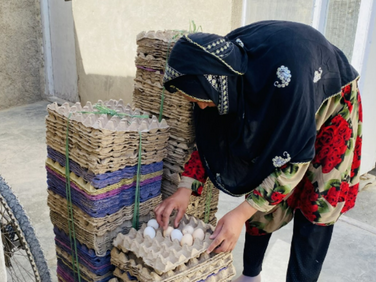 lives in the Wali Aser region of Mazar-e-Sharif city with her five children — two sons and three daughters. Mazar-e-Sharif is currently experiencing crisis levels food insecurity, with thousands of families struggling to get by. Zakira’s husband died two years ago, after contracting Covid-19, leaving her the family’s sole breadwinner.
lives in the Wali Aser region of Mazar-e-Sharif city with her five children — two sons and three daughters. Mazar-e-Sharif is currently experiencing crisis levels food insecurity, with thousands of families struggling to get by. Zakira’s husband died two years ago, after contracting Covid-19, leaving her the family’s sole breadwinner.
Last year Zakira joined a Hand in Hand Self-Help Group named Hadaf, along with a group of local women. She received business skills training from their female group leader as well as specific training on layer poultry farming. This included nutrition and feed formulation, and how to find a market for her eggs. After her training was complete, and armed with her first business plan, Zakira received a ‘start up kit’ of layer chickens, feed and a chicken coop.
Zakira has now increased her flock to 34 chickens, and can produce around 20 eggs a day. She earns AFN 6,000 (USD 67) a month selling her eggs at the local market. As eggs are a valuable source of protein Zakira knows she will always be able to give her children a nutritious meal.
Zakira says, “I and my children often slept with an empty stomach, but this poultry farm which I started with support from Hand in Hand Afghanistan saved me a lot from the worries of life and made me very comfortable.
“This small business brought a lot of changes in my life, such as having enough food for my children, providing clothes and school stationery and meeting our basic household needs. This is a huge happiness for us. I am now hopeful for a better future for me and my children. I wish to become a businesswoman in the future and expend my business by raising both layer and broiler chickens.”
‘People can’t go to the market. But I can bring the market to them’: Bathsheba
Ask a resident of Kitui County, Kenya what scares them most about the coronavirus. Some will say illness. Others will say joblessness. But just as often as not, you’ll get a third answer: hunger. With markets shuttered, transportation halted and strict curfews imposed countrywide, in some counties the greatest threat isn’t the virus but a simple scarcity of food.
Enter Bathsheba Kilonzi, smallholder farmer, Hand in Hand member, and answer to many of her neighbours’ prayers.
Konza Village, Machakos County
Kenya’s lockdown: empty markets, bare cupboards
Kenya’s health system isn’t equipped to cope with Covid-19. Prevention, not treatment, is the country’s only hope. That was the government’s thinking in early-March, when it imposed sweeping lockdown measures that banned large gatherings, effectively shutting down markets countrywide. To be certain, these measures have helped halt the spread of the virus. But in a country where 85 percent of food goes through outdoor, informal markets, the policy has come at a precipitous cost.
With access to tens of thousands of smallholder farmers in dozens of counties countrywide, Hand in Hand is doing everything we can to help. Since the start of the lockdown, our trainers have instructed almost 15,000 members by phone and SMS on finding new sources of seedlings and crops where necessary, then making sure their produce finds buyers. Aside from helping to prevent tens of thousands of Kenyans from going hungry, it’s keeping thousands of smallholder farmers from going under.
Finding opportunity
 Before coronavirus, Bathsheba was a smallholder farmer growing spinach, kale, onions, carrots and pawpaw, a cousin of papaya. Every week, she would travel to her local market in Konza village and set up a stall. “When the lockdown came, people couldn’t go to the market. But after I spoke to Hand in Hand I realised that I could bring the market to them,” she says.
Before coronavirus, Bathsheba was a smallholder farmer growing spinach, kale, onions, carrots and pawpaw, a cousin of papaya. Every week, she would travel to her local market in Konza village and set up a stall. “When the lockdown came, people couldn’t go to the market. But after I spoke to Hand in Hand I realised that I could bring the market to them,” she says.
One sweltering morning in early-March, Bathsheba strapped on a facemask, packed a basket and set out selling her vegetables door-to-door. Demand, she discovered, was huge. With the help of her Hand in Hand Self-Help Group, she identified other smallholders with produce to offload, and has since become her village’s biggest distributor. “I follow all the precautionary messages such as wearing a face mask while delivering my supplies,” she says.
Today, Bathsheba’s monthly income has doubled, reaching 10,000 KES (US $100) a month. Not only are her husband and three children financially secure during this incredibly uncertain time, but she’s never felt prouder.
“I feel good being part of the team that is playing a role in curbing the spread of coronavirus by helping people access food as they stay at home,” she says.
By the numbers
Income before outbreak: 5,000 KES (US $50) a month
Income now: 10,000 KES (US $100) a month
Farmers reached via phone with support and advice: 15,000
‘In order to survive we were forced to be creative’: Rhoda
Upcycling factory offcuts and old tyres to make handbags and sandals. That was the Uwezo Wema Self-Help Group’s business model, and for two years, it worked. Then came the coronavirus and, according to group chairperson Rhoda, “everything changed”.
“Business performance has gone down, and the usual products we used to sell during the pre-corona period are no longer in high demand due to change in people’s expenditure,” she explains. “In order to survive we were forced to be creative.”
If demand for sandals and bags had cratered, for two others items it had gone through the roof. So it was that Rhoda and her Uwezo Wema sisters started making and selling face masks and soap, finding themselves front and centre in their community’s response to Covid-19.
Babadogo, Nairobi
A world in turmoil. A country in lockdown
Taking rare a break from her sewing machine recently, Rhoda spoke to her Hand in Hand trainer over the phone. Visiting, she agrees, would be out of the question. Just days after its first confirmed case in early-March, the government of Kenya imposed a strict and wide-ranging lockdown on this country of 51 million, fearing its health system couldn’t cope. Inter-county travel was banned and a 7 pm to 5 am curfew was imposed, but millions of Kenyans who had to work to survive, did. The result, say officials, is a country where “the virus is firmly in our midst.”
To the extent that Kenya weathers the storm, it will because of people like Rhoda and the Uwezo Wema Self-Help Group leading the grassroots response. “The government is not able to fight this disease alone,” she says. “The largest responsibility lies with individual citizens to ensure they wash their hands, sanitise, wear masks and maintain social distance. My job as a businesswoman is to help them do that.”
With access to tens of thousands of members in dozens of counties countrywide, Hand in Hand’s job as an NGO is to help businesswomen like Rhoda lead the way. In only a month, our trainers have reached more than 11,000 members over the phone to provide advice on retooling their businesses to make face masks and soap. Aside from empowering tens of thousands of Kenyans to fight the spread of the virus, we’re keeping thousands of businesses from going under.
‘We are thankful’
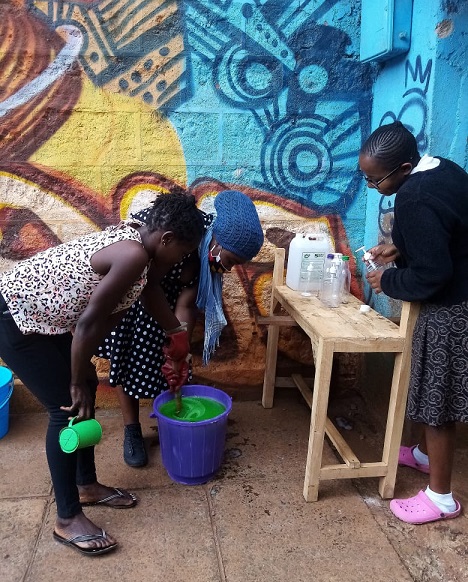
Uwezo Wema group members make soap from alcohol, aloe vera and lemon.
Rhoda, it turned out, had beaten us to the punch. “After the government announced the precaution measures to be put in place like washing of hands with soap and disinfecting our hands and wearing masks, we decided to focus on the production of masks and sanitisers. This is because there was no big competition as in the liquid soap making,” she says.
The transition from bags to masks was straightforward enough, says Rhoda, who quickly developed a prototype after watching instructional videos online. For the most part, the group is still using upcycled cloth offcuts – keeping their business environmentally sustainable even as they contribute to the greatest public health push in Kenya’s history. Filters between the masks’ two layers and heavier cotton to keep them durable have marginally increased costs. As for making soap, Rhoda remembered a recipe from one of her Hand in Hand training modules using alcohol, aloe vera and lemon.
“We currently sell about 200 masks and anywhere from 15 to 50 litres of soap a day,” she says. It’s enough to bring in about 20,000 KES (US $200) a month – a far cry from the 100,000 KES (US $1,000) her group made each month before the virus, says Rhoda, but “we are thankful that at least we can make something during such a time.”
For those lacking the luck – and savvy – of the Uwezo Wema Self-Help Group, Rhoda keeps back a number of masks each day to give away. “But not to everyone,” she says. “We need to earn some profit for sustainability.”
By the numbers
200 masks and 32.5 litres of soap sold each day
20,000 KES (US $200) a month in income
11,000 members reached with advice on making face masks and soap
Meet Zahra, the Hand in Hand trainer fighting Covid-19
When Zahra started working for Hand in Hand six months ago, the 25-year-old thought she’d be training women to run their own micro-businesses, helping them thrive in the long term. Now, as the country braces for a Covid-19 crisis some experts fear could be globally significant, Hand in Hand’s youngest trainer finds herself fighting for their short-term survival instead.
“It’s a very heavy responsibility and we feel a sense of fear. If someone has the virus, it’s difficult to control it,” says Zahra. “On the other hand, it’s a pleasure to help our people, who are really in need and live in poverty.”
Across Hand in Hand Afghanistan the story is the same, as the entire organisation retools – seemingly overnight – to respond to the threat of the virus. Between thousands of members living in hard-to-reach areas, deep bonds with local officials, and a senior management team with decades of humanitarian experience, Hand in Hand Afghanistan is uniquely well-suited to help. So when a government lockdown caused the suspension of our usual training on 30 March, we were ready to adapt and keep fighting.
Phase One of Hand in Hand Afghanistan’s Covid-19 Emergency Response kicks into gear on 5 April, as teams fan out across Parwan, Balkh and Herat Provinces delivering soap, chlorine solution and virus prevention training to some 26,000 people. Fundraising for Phase 2, where we hope to at least double that number, is underway now.
“We consider it our duty to inform people about methods of prevention. We can save lives,” says Zahra. “I had dozens of members who weren’t aware about the coronavirus and how to reduce the risk of infection until I told them.”
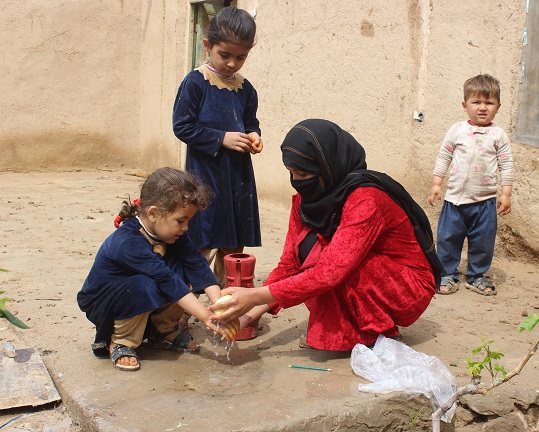
Handwashing time for Sharifa and family.
Sharifa, 24, was one of them.
“Zahra told us about coronavirus and how dangerous it is,” says the mother of four young children. “She gave me and other women health instructions such as not to go to crowded places; to wash our hands repeatedly with soap many times throughout the day; to use a mask and gloves, which we have for our poultry farm, if we go out in public; and to cover our mouths with a cloth when we sneeze.”
With no health services in the area, Zahra worries that Hand in Hand’s is the only help Sharifa and thousands more like her will get. “And even if they can make it to the public hospital in Mazar, we know their capacity is very low. They don’t have the equipment to cope,” she says.
One day, Covid-19 will pass – a global health crisis leaving a global economic crisis in its wake. When that day comes, Hand in Hand will be ready to help our members work their own way out of poverty, the same we have since Day One. Until then, we’re fighting Covid-19 with everything we’ve got.
“The second thing I worry about right now is the financial aspect,” says Sharifa. “The first thing is our health.”
By the numbers
4,000 households reached
26,000 Afghans provided with soap and chlorine solution
20 minutes of virus prevention training per household
‘Helping us help ourselves’: Josephat
Josephat Mwaniki Njeru had run his own business for nearly four years, but it was becoming clear he needed a little bit of help.
It didn’t matter that the organisation offering it, Hand in Hand International, included nearly 20 local women and not a single other man. In fact, he recognised the challenges women faced in finding jobs in Kenya’s Kirinyaga County, and he saw no downside in learning from their tenacity.
With aid and support from Hand in Hand’s Self-Help Group, Josephat has gotten the boost he needs. His shop, which sells sugar, rice and flour among several other goods, is no longer struggling. After one expansion, he already has eyes on making it even bigger.
“There would be no difference if it was just a men’s group,” Josephat said. “However, from what I see, these women have been involved in many more activities than men. Men don’t always like group formations, but right from when I was a child, I liked group activities. I like being involved in doing something.”
Kirinyaga County, Kenya
A Decision Made
From early on, Josephat was faced with two choices: he could go into farming, like the majority of residents, or he could open a business. That question was answered when he realised the land he owned was not going to help him provide for his family.
Small-scale farming is prevalent in the region and most farmers grow coffee, tea, rice and various fruits and vegetables. None of those crops, though, would help Josephat earn enough to provide for his wife, let alone four children or three grandchildren.
“I have three-quarters of an acre of land,” Josephat said. “That is not sufficient, so for me, I don’t have much option other than business. It’s the main thing — it’s where I eat from. I do everything from the business. I love my business.”
Taking A Risk
Josephat had only KES 1,700 (US $17) to his name when he decided to open his shop, and although he was able to obtain a loan for KES 15,000 (US $150), he had been struggling to pay it back. Whatever profits he earned went immediately into feeding his family.
That’s when he and three other men were introduced to Hand in Hand, which offered them the opportunity to learn from local trainers about responsible shopkeeping. Josephat loved what he heard and quickly bought in to a group of 19 women.
“Even if I am the only man in the group, I feel comfortable because we are doing things together and when we carry out activities, we do them together,” Josephat said.
Those activities included lessons on the principles of table banking, responsible inventory and financial management, all of which Josephat knew he needed. Soon, his income started to increase, allowing him to generate more than KES 7,000 (US $70) in profit a week.
The original loan has long been paid off, as has a second, and he’s trying to secure yet another in order to help his business continue to grow.
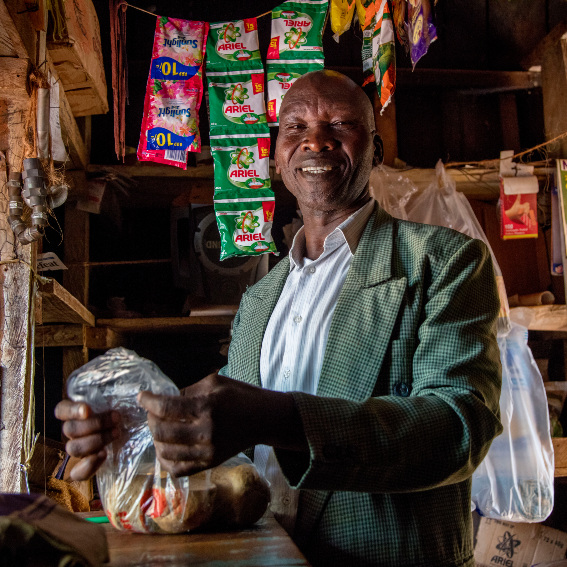
“Before I joined Hand in Hand, I did not know how to organise myself, but after we started to learn some lessons, I asked many questions,” Josephat said. “Where I don’t understand, I ask for help. Where my business is not doing well, I ask for help. I try to put in practice what the teacher had recommended, so I see my business has improved from what it was before.”
Paying It Off
Although Josephat takes care to reinvest much of his profits into his business, his family has benefitted greatly from his larger earnings. His four children, who range in age from 26 to 33, can live slightly more comfortably because Josephat wants to pay for his grandchildren’s school fees.
“What I can say? These donors, they really help,” Josephat said. “When people come together in groups, they benefit immensely. Isn’t that good? What we lack while in our homes is backing and ground for exposure to push us so that whatever economical activities one is involved can be boosted and grow so that one can depend on it sustainably.
“It will improve your life standard. I have said several times that funds are the main problem. We have a lot of duties: you want to eat, you have children at school, hospital bills and other things. So, what happens when you look back at your backyard and you see that you don’t have money? Donors are really helping us help ourselves.”
The group has also helped Josephat’s family in another way. His wife has begun working at a tree nursery that was also set up with the assistance of the Self-Help Group.
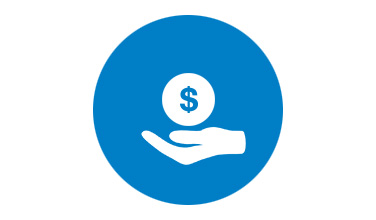
Finally repaid a loan that had long been outstanding
Learned how to do an inventory of his stock
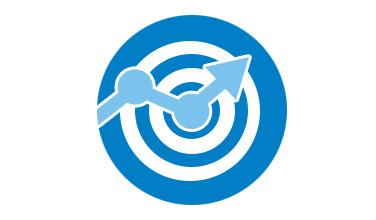
Developing plans to continue expanding business
